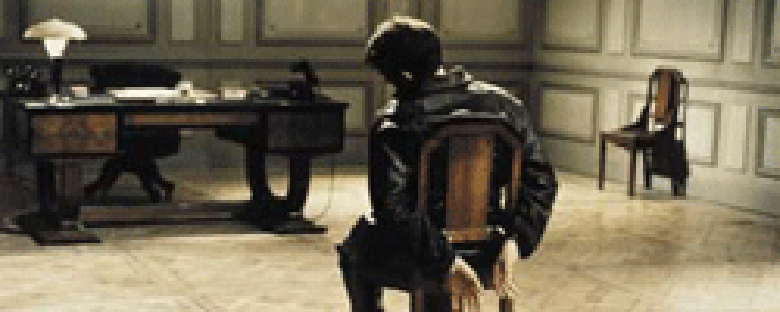Reviews
L’Armée des ombres
Jean-Pierre Melville
France / Italy, 1969
Credits
Review by Leo Goldsmith
Posted on 31 May 2006
Source Rialto Pictures 35mm Print
Related articles
Reviews: Le Doulos
Reviews: Le Samouraï Reviews: Le Cercle Rouge
Jean-Pierre Melville has always been an anomaly. During his lifetime, he remained resolutely on the fringes of French film industry, fitting neither the cinéma du qualité nor the nouvelle vague categories. Even now, there remains an uncertainty about whether to classify Melville as an auteur, a witty practitioner of genre, or a mere oddity. His films are melodramas, albeit in a sense that is almost exclusively concerned with a masculine homosociality, its bonds and its betrayals, rendered in an invariably tragic mode. His late films especially are manneristic above all, eschewing coherence and realism in favor of an excess of style and gesture. But it remains unclear whether this mannerism alone qualifies his entry into some kind of auteurist pantheon or whether he is simply a clever stylist.
Army of Shadows, Melville’s grey guignol of honneur and bonhomie, may lack some of its director’s most overt idiosyncrasies, but it still manages to contextualize — I daresay, provincialize — the rest of his body of work. The shots of the Arc de Triomphe, occluded by uniformed Germans, that bookend the film hint that perhaps all of Melville’s tales of friendship and fortitude stem from a kind of beleaguered Frenchness originating with La Résistance. In his gangster films, his themes always appear subservient to more primary concerns with genre and style. But here the codes of endurance and loyalty take on a greater, more emotional importance, constituting the way of life not only of a small cadre of shadowy operators, but of an entire nation under siege. The result is in many ways the height of Melville’s splicings of daredevil, adventure-story heroics and exceedingly grim twists of fate.
True to Melville’s aesthetic, Army of Shadows is at once economical with its characters (and even more so with its special effects) and liberal with its details and set-pieces. Each character is meant to represent several actual figures of the Resistance (there are also some soft-focus cameos by icons like Charles de Gaulle), and each suggests a vast network of operatives and subterranean goings-on. There is Gerbier, the frumpy, impassive ringleader; Felix, the crusty, reliable sidekick; Jean-François, the resourceful and reliable former-flyboy; and Mathilde, the oxy matron of the shadow army, whose vigilance and ingenuity almost (almost) make her worthy of Melville’s respect for his male characters. Each of their carefully constructed rescue missions and executions is narrated in a fastidious, rhythmic montage; Melville’s characteristically sterile compositions and aural minimalism agonizingly distend the time it takes for each task’s completion.
As Gerbier, the implacable mastermind of the underground, Lino Ventura leads the film’s roster of trenchcoated Resistants, and he is the most unlikely of heroes. Dour and paunchy, he enters the film as a P.O.W. in a prison camp somewhere in the French countryside, tossing out shrewd quips and Gallic shrugs to his traitorous Vichy captors. By mid-film, Gerbier becomes mesmerizing in his unflappability — ruthlessly overseeing the throttling of a former compatriot, and drowsily awaiting his first midnight parachute jump over France while enduring the pluckiness of an R.A.F. officer who persistently offers him tea and sandwiches. Like so many Melville protagonists, Gerbier exhibits an intense single-mindedness, which here somehow comprises a passionate love of his country, an almost erotic devotion to his superior in the Resistance, Luc Jardie, and an overwhelming (and mostly accurate) sense of his own immense importance. (Early in the film, he dupes an eager fellow Resistant into self-sacrifice so that he himself can escape Gestapo headquarters.) Ventura is able to house all of Gerbier’s seemingly conflicting allegiances in a single, unassuming, and heavy-lidded glare.
Filtered mostly through Gerbier’s perspective, Army of Shadows is also single-minded in its intent. Less compendious than Ophuls’ The Sorrow and the Pity, less kitchen-sink realist than Simenon’s novel, Dirty Snow, Melville’s portrait of life during wartime is, like its protagonist, blinkered to mundane discomforts of everyday occupied France. One can hardly imagine a life for Gerbier before or after the Resistance. Like Jef Costello in Le Samouraï, Gerbier’s job defines him utterly — there is only the glimmer of something more. And when in the safe haven of London, Gerbier observes an officers’ dance persisting during the blitzkrieg, it seems to him something pleasant, but alien. As the film’s epigram implies, “Bad memories, welcome… you are my long lost youth” — struggle and hardship are real life, all else is illusory.
We don’t do comments anymore, but you may contact us here or find us on Twitter or Facebook.



